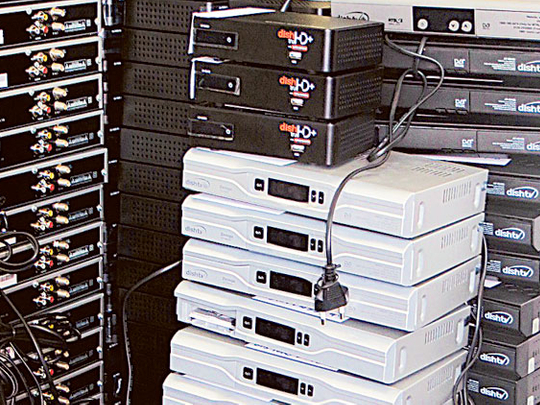
Dubai: After a sustained campaign, the alliance of regional TV broadcasters finally may be seeing the latest war against piracy turning in their favour. A series of raids carried out by local authorities in recent weeks have netted contraband satellite TV receiving set-top boxes and legal action pursued against the offenders. These could result in the “pirates” being hit with hefty fines, which could also have a deterrent effect on others engaging in similar activities.
“Any fight against intellectual rights piracy is tough, and we are very clear in our stance that we are dealing with organised crime,” said David Butorac, CEO of the pay-TV broadcaster OSN, one of the members of the Anti Piracy Coalition that also includes the likes of Motion Picture Association of America, MBC Group, NileSat and du. “But the toughness of the challenge against piracy is no reason why we should not put up a fight and win.”
It was in March that the Coalition came into being — in their sights was the unlawful beaming of satellite channels, especially South Asian programming, through set-top boxes usually brought in from India. (India has a plethora of digital satellite TV broadcasters and set-top box manufacturers. Any outflow of these into markets outside of India, even if this is unlawful, translates into a major revenue source for them.)
By doing so, these service providers were delivering premium TV content for which they did not have the rights for the UAE and other Gulf territories. They were able to get subscribers, either individuals or entire residential buildings with a sizeable South Asian tenant base, by offering packages often at significant discounts to what authorised cable and satellite providers were offering. (Local landlords, by and large, are now disconnecting the common service they used to provide residents at their buildings.)
“Many people who are paying for the South Asian platforms are paying for something that is clearly illegal in this market and probably not even aware they are doing so,” said Butorac. “The Coalition campaign [since March] has been as much about educating these consumers as tackling the actual pirates.”
According to Coalition sources, the laws in the UAE governing intellectual property and broadcast rights are clear enough on what is right and what’s not. “In the UAE, authorities are willing to prosecute the laws of the land and that’s what is turning the tide now against the set-top box piracy,” said Butorac.
On whether the Coalition or its individual members would join in trying to get verdicts against the offenders, Butorac was emphatic. “We will pursue prosecution; in 2009, when OSN was directly affected by our channels being available on pirated boxes, we managed to close it down. There have been significant successes in the past against content piracy and we are confident it will continue.
“In the latest instance of this fight, arrests have been made and penalties imposed should make such operators think a lot about what they are getting into.”











